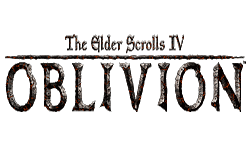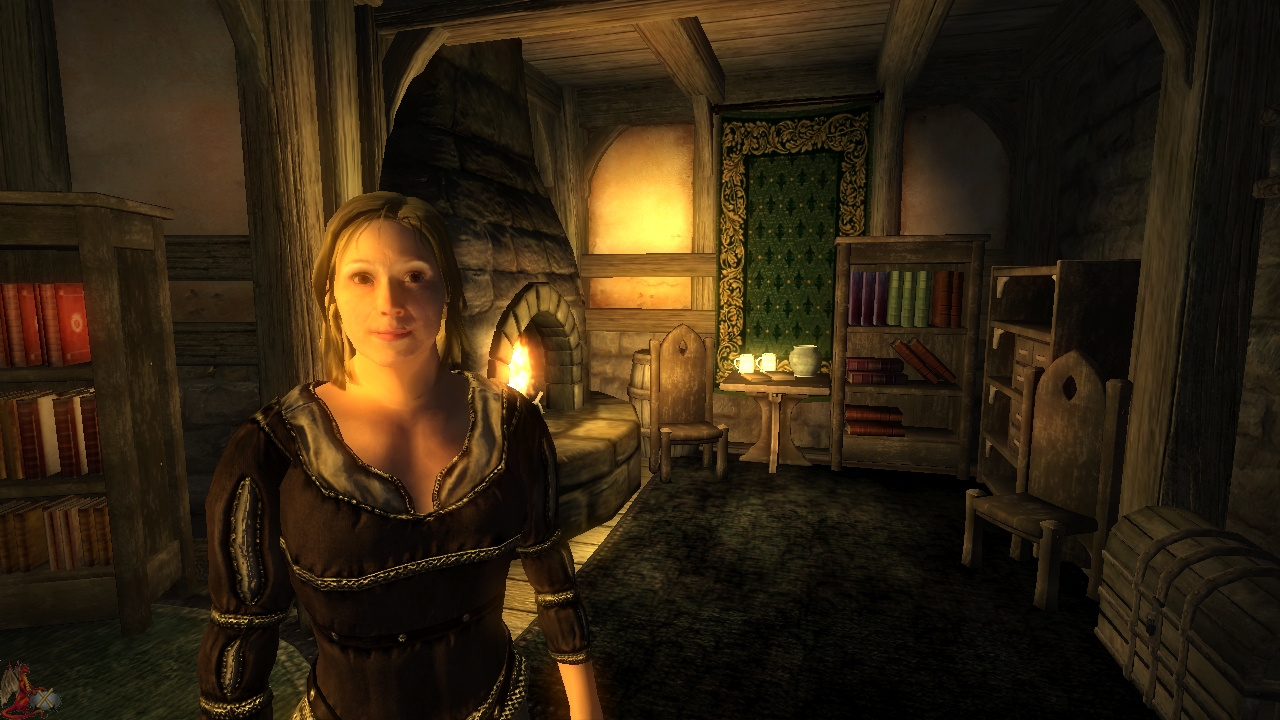|
|

|
BATTLE SYSTEM
|

|
INTERACTION
|

|
ORIGINALITY
|

|
STORY
|

|
MUSIC & SOUND
|

|
VISUALS
|

|
CHALLENGE
|
Variable
|
COMPLETION TIME
|
20-200 hours
|
|
OVERALL
4.5/5
|
Rating definitions
|
|
|
MMORPG's do a great job of immersing players into a virtual world where they can always find something new to do or someplace new to explore every time they play. But this year, Xbox 360 owners can find a very similar experience in the single-player RPG, Elder Scrolls IV: Oblivion. The sequel to 2001's Morrowind, Oblivion expands on the series' tradition in every way. With a massive map, improved battle system, and amazing graphics, Oblivion is definitely one of the best RPG's available.
The character's race, gender, and physical features must be selected before the game begins. The level of detail here is amazingly deep. Thirty minutes to an hour could easily be spent meticulously customizing a unique character. From the shape of the head to the color of the skin, just about every part of the face can be altered, but unfortunately the body size can't be changed. Once that's finished the main character finds himself or herself in prison for some unknown reason. In minutes, the Emperor of Cyrodiil, the country in which the game is set, and his guards pay him a visit. By chance, a secret passage out of the castle is in the main character's cell. The Emperor recognizes the character from his dreams and his destiny begins. Assassins have killed most of his heirs, and now they are after him. The Emperor allows the player to escape with him from the dungeon, which serves as the tutorial for the battle system. During that time the player must their choose character's class and main attributes.
The story definitely isn't the main draw of the game. The Emperor's escape attempt doesn't end so well. He imparts the player with the task of finding his lost heir and close shut the gates that have appeared all around Cyrodiil. The gates lead to Oblivion, the game's underworld, where the evil Daedra dwell. Entering Oblivion, finding a way to close the gates, and restoring the heir to the throne are the primary objectives of the game. Once the player leaves the first dungeon, however, he can forget all about the plot and do his own thing.
Oblivion's most prominent feature is the open-ended structure. Gamers are given a great number of things to do: joining a guild, fighting in the gladiatorial arena, becoming a blacksmith or a thief: just about anything imaginable. This title does a good job of guiding the player to his next objective and keeping things in order. Aside from the main quests that follow the storyline, there are hundreds of optional quests all over the world. Merely speaking to townspeople can lead you to your next quest such as helping farmers defend their crops from goblins or finding out whose breaking into an old woman's home. Joining different guilds also reaps certain benefits. There are four distinct guilds: warriors, mages, thieves, and the brotherhood. Each has its respective set of quests only available for guild members. What's interesting is how being a member of the guilds affects gameplay. It may be problematic to be a part of contrasting guilds. For instance, the warriors' guild upholds a code of honor. The player can't steal things and still be a part of the guild, so joining the thieves guild is out the question. This system encourages multiple playthroughs to get the whole experience. Another external factor that adds to the replay value would be the Xbox Achievement Points for the game obtained by meeting certain requirements. Some require the player to rise in rank among the various guilds, defeat all the opponents in the gladiator matches, and close all the gates to Oblivion.
 Chat with townsfolk for the local gossip.
Chat with townsfolk for the local gossip.
|
|
Logical improvements have been made to Morrowind's battle system. Like its predecessors, Oblivion is still a first-person RPG, but this time it's not based solely on stats. In Morrowind, when the player hits an enemy there was still a chance that he would receive no damage. That is because each hit was like a dice roll. The higher the characters level and stats, the higher his chances of hitting the enemy. Thankfully, in Oblivion things are handled more realistically. When a character strikes at an enemy, he or she will always hit him, though the amount of damage depends on character stats, enemy stats, and whether or not the enemy is blocking. Another problem with the past game was that blocking was also based on stats and happened randomly. Now blocking is allocated to the left trigger button. However, defending against physical and magical attacks only lowers the amount of damage; it does not prevent damage all together.
The character development system is a unique and a fresh approach to leveling up. Unlike most RPG's, where leveling up calls for an increase in all stats, Oblivion is all about improving specific attributes. Attack with a sword, and the sword skills improve. Use cure magic, and that skill is improved. Players will only improve skills used continuously. The character still levels up, but to do so players must improve any combination of the seven major skills, chosen during the dungeon tutorial, ten times. It's possible to just focus on one skill and improve it ten times, improve five skills two times each, etc. With each level up, the character must first find a bed and rest, then choose to improve three of the character's eight main attributes. This intuitive system allows for deep character customization. Players may choose to focus on one archetype, like a warrior, mage, thief, or combine different attributes to create characters like a warrior-mage with both physical and magical abilities. The system allows for non-linear gameplay giving gamers the choice of what type of character the want to become. Each type of character can make it seem like a completely different game. A character with great strength can run up to enemies and attack head on with weapons. Mages might have to attack from a long range, and thieves can sneak up and attack from behind for critical damage. The system makes each playthrough a unique experience.
The gameplay shines through the incredible graphics. Bethesda has put a great amount of care into the game's world and it shows. The many environments are incredibly detailed. Every part of each forest, cave, and city is unique. Most of the world is covered in lush forestry, but each tree and rock is finely polished, avoiding a generic cut-and-paste feel. Caves and cities look similar to one another but still retain a distinctiveness that makes you want to explore each to its fullness. The graphics engine enhances character animations and physical appearance. Faces appear amazingly realistic. Characters faces include bags, wrinkles, and all sorts of blemishes. The physics engine allows for an impressive array of fluid movements of NPC's, monsters, and objects. The lighting effects are also greatly improved. From torches to spells, the graphics engine boasts strong and vibrant lighting. This is surely one of the best looking console game currently available. Welcome to the next generation.
 Enemies are constantly in your face, giving you little breathing room.
Enemies are constantly in your face, giving you little breathing room.
|
|
Regrettably, despite looking fantastic, the game has its fair share of problems in the graphical department, such as glitches. Given that it's pretty much impossible to make a game of this size without some bugs appearing in the final product, Bethesda still deserves credit for eliminating several bugs before releasing the game. Events like freezing during the many load screens, crashes, invisible walls, and item duplication may occur during gameplay. Saving often is the best remedy, as it is possible to lose progress because of freezing and crashes. Another problem is the incessant load times when out in the countryside and entering buildings. When outside of town, the game loads each subsequent area every seven seconds or so. This can also occur during combat and can be trying at times. The problem is magnified when on horseback. When covering great distances with a steed, the game must load even more often. It's unfortunate that Bethesda didn't utilize the 360's hard drive to decrease load times. Attempts were made to store data in the cache and cut load times, but this can cause longer load times and freezing if the cache isn't manually cleared from time to time. In the end these hitches do not completely mar the game, but can be quite annoying.
Another technical achievement is the game's sound design. The orchestrated music is epic and could fit naturally in films such as The Lord of the Rings trilogy. In town, the music is very soft and serene, but in hostile environments, the music changes appropriately to fast-paced tracks that keep up with the action. There are a good number of tracks to keep the score from getting old for a while. But after a hundred hours or so, the music starts to get quite repetitive. A variety of sounds effects such as weapon swings, magical attacks, and the enemy battle cries brings the action to life. The sound effects are what you would expect from this type of game, but unfortunately the aforementioned bugs can hamper things a bit. At times you might swing a sword, hit an enemy, and not hear the swing, the collision, or the enemy recoil, until seconds later. There are also times when the sound effects are completely missing. This is another annoying issue but it doesn't detract too much from the experience.
The game features a wealth of voice acting and it is all top-notch. The characters' mouths are lip-synched perfectly, unlike many other RPG's. Every character in the game speaks, though it is easy to tell that some are voiced by the same actor. Emotions are portrayed very accurately and there is little overacting. Characters that are supposed to be depressed will sound so and ecstatic characters will show how happy they are without overdoing it, though it can be a little creepy. The main character doesn't speak at all. You choose what he will say or ask from a given set of options and the characters will respond appropriately. It's a little awkward that many of the characters say the exact same phrases but it's forgivable. At least there's still some variety in their responses. The voice acting adds depth to the game's world and gives the story a movie-like quality.
There is an amazing value in Elder Scrolls IV: Oblivion. It has reasonable potential to last over two hundred hours, and with Bethesda periodically releasing expansions over Xbox Live it might be the only game Xbox 360 owners play for a very long time. Oblivion has the tendency to take several hours away from the players life at a time ,like any given MMORPG would. The main quest can be completed in about twenty hours, but that's not the reason to play. There is so much depth to the game; it's like having a second life. With incredible graphics, a humongous world to explore, rich character customization and gameplay, and amazing replay value, it is good candidate for RPG and Game of the Year. There's very little reason for any Xbox 360-owning RPGamer not to own this title.
Review Archives
|









